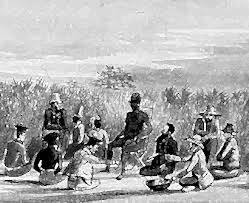Mzilikazi was a chief under Shaka until about 1820 when they fell into a dispute regarding spoils of war. The dispute led to battles with Shaka’s army and eventually forced them to migrate more than 1500km north. Their first settlement was at Ekupumuleni where they raided the Sotho and Pedi. Due to the drought that ensued that year they began to raid more and more of their neighbors even going as far as the Limpopo to raid Shona cattle.
Mzilikazi crossed into Zimbabwe in 1838. They split into two groups, one led by Mzilikazi and the other by Gundwane. Gundwane Ndiweni and Nkulumane the heir travelled and settled close to the modern-day Bulawayo which is Zimbabwe’s second largest city. The second group led by Mzilikazi tried to settle in present day Zambezi Valley but had to retreat because of the problems associated with tsetse flies that killed theri herd. The group led by Gundwane subdued the Rozvi State and even demanded tribute in the form of labor and cattle. Mzilikazi’s group also attacked and subdued the Tswana and Kalanga. However when they finally met up again some of the leaders within Gundwane’s group were resisting Mzilikazi’s rule. As a result many were killed and Nkulumane was driven down across the Limpopo. Mzilikazi then retained dominance over the Ndebele people.
The land occupied by the Ndebele has been previously inhabited by the Changamire State since the 12th century. The only outside interference they has experienced was with the Portuguese, Swahili and other traders. Other groups that settled in previously Shona areas included the Soshngane who settled in the South-east, Zwangendaba who defeated the Rozvi State but it was Mzilikazi who finally defeated the powerful Changamire Rozvi State.






23 responses to “Origins of the Ndebele in Zimbabwe”
The Ndebele built South Africa and built zimbabwe. They are a proud people who will rise again soon. “And still we rise….”
And where do we belong.
How did the Ndebele build Zimbabwe?
Mzilikazi, was a great military general. Shaka zulu was a not great he was a savage like alexander the non-great whom we have been taught to emulate at the expense of good ones like Mzilikazi. His son Lobengula was had a common saying as he taunted the colonialists who could not capture him. ” Have you ever seen a chameleon catch a fly? England is the chameleon and I am the fly”
mzilikazi was a great leader.just wish we could follow his ways
yahhhh true that wish we could all do that.we will always remember you for the good works
mzilikazi was a great leader. wow fantastic
ahh what a good leader
we will rise again. mayihlome
rise now! why wait?
It seems so comments are now based on tribalism… Guys we r a nation nt two separate states
How fantastic Mzilikazi was he raided cattle and fought too
mzili was a great leader indeed
Lobengula, killed us by bringing Rhodes closer…
lobengular was just ignorance
NDEBELE PEOPLE ARE GOOD PEOPLE WITH BRILLIANT SKILLS .BUT ARE RELUCTANT TO DO THINGS
Wasenza uMzilikazi
Mzilikazi was greedy and should have given shaka what belonged to shaka, At the end of the day ndebeles are just zulus living in Shona land and should go back to their homeland and rise there.
And what was that my brother if I may ask
mzilikazi was just fair he didnt even spare his son khulumane
yaaa ndimi vana tajamuka manje hamulume
true that
that is so true